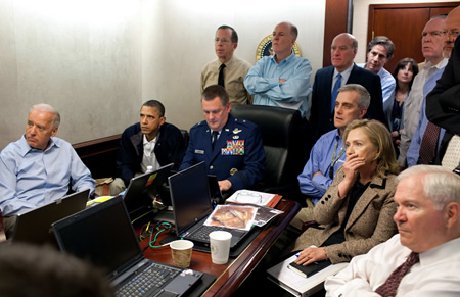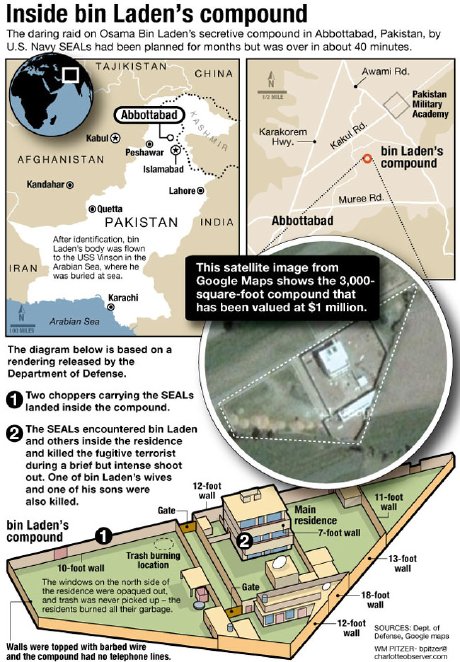Adil Najam
What do Pakistanis think about how Osama Bin Laden met his end, the implications of that end?
There are as many opinions on what happened in Abbottabad as there are Pakistanis. Maybe more. But there is no sense whatsoever where the government of Pakistan (or any of its major institutions) stand on what happened – or stood when it was happening. For 36 hours now the world has been waiting to see what Pakistan does and says – the silence and incoherence from Islamabad has not just been embarrassing, it has been damning. Finally, key institutions in Pakistan have begun trying to piece a narrative together – unfortunately it is way too late and the narrative itself rather lame.
When I put up a short post on Osama Bin Laden’s death soon after the news broke, I had hoped that in time more details would become available and we would get more clarity on what happened and how. We do now have more detail. But certainly not more clarity. The story about what happened in Abbottabad now lives in Spin-abad. Everyone – from governments, secret agencies, the media, the Twitterati, and your spinster aunt – are taking a spin. Many are taking multiple, sometimes contradictory, spins. Everyone except the Pakistan government.
That, of course, is a surprise – not only because the Pakistan government does have a lot of explaining to do, but even more because it is in the interest of the Pakistan government to do that explaining itself rather than have someone else do it for them. Yet, up until it was already too late, Pakistan seems to have abdicated that responsibility. In fact, President Barack Obama, Secretary Hillary Clinton and Senator John Kerry seemed to be making that (half-hearted) case for Pakistan more than anyone in authority in Pakistan. Given that President Obama had informed President Zardari before the speech from the US President, one would have assumed that the Pakistan President and his media handlers would have their own statement ready to go on the air minutes, if not seconds, after President Obama’s speech. This is not about spin and PR, this is Diplomacy 101: Own and define the narrative as soon and as clearly as you can before someone else defines it for you – especially if the narrative is likely to be unfavorable.
But the narrative, itself, is not the core of Pakistan’s challenges. The problem is the facts on the ground and the government’s inability and unwillingness to explain them. Pakistan is used to the feeling of the world ganging up on it. But there are good reasons for the questions being asked of Pakistan by the world today. There are even better reasons for the questions being asked of Pakistan by Pakistanis today. Whether the government comes clean to the world or not, it is vital that it respond to Pakistanis. The first is a matter of national image (no trivial issue, that), but the latter is a question of citizen trust in national institutions (an existential element of statehood).
The fact is that there is a Pakistan case to be made on this issue. And it needs to be made to Pakistanis much more than to the rest of the world. It is a case that forcefully stresses that a world, and a Pakistan, without Osama Bin Laden in it is a vastly better world than one with him in it – this is a villain who orchestrated events that have left more than 30,000 Pakistanis dead in extremism and terrorism. It is a case that legitimately highlights the sacrifices that Pakistan and Pakistanis have, in fact, made in the fight against terrorism. Most importantly, it is a case that honestly analyzes what happened in Abbottabad – it is not a surprise that Osama Bin Laden was found in Pakistan and in a large urban area (just like nearly every other major Al Qaida figure captured) – but an explanation is owed on why Pakistani intelligence failed to make the connections that led to him, an explanation is owed on exactly what Pakistan’s official role in the final operation was (or was not), and an explanation is owed on exactly what Pakistan’s strategy on countering terrorism is, who is running it, and why it is not working well enough or fast enough.
In a country and an ‘establishment’ as divided as Pakistan, this cannot be an easy conversation; it is not supposed to be. It is time to ask honest and tough questions of everyone. It has long need a necessary conversation; now is the time to have it.






















































Lol. ‘Obama’s refusal to realease the photos is a slap on the faces of conspiracy theorists. he didn’t have to prove anything to anyone’. someone’s really got an imagination to suit his ideas
this is a good defence though. and should be practised in courts worldwide.
Meengla,
One can continue to blame it on incompetence, but this would entail an extraordinarily high degree of incompetence, to the extent of not being plausible at all.
Whatever else the police in our region are capable of or not, but they are capable of saturation coverage of sensitive, high risk areas. For instance, starting several days before every important occasion in India such as Independence Day, Republic Day etc., when there is a threat of terrorist attacks, every single dwelling for several miles around the major venues are completely ‘sanitized’. In Delhi and virtually every state capital where there is any risk of an attack. All hotels, lodges, guest houses and even most of the homes in ‘sensitive areas’ are checked and their occupants accounted for. Despite the lack of good intelligence, as has been repeatedly proved, at least there is the capability for policing. The police does not bother itself with niceties and is often least bothered about the convenience of residents, but it gets the job done. Even in megacities such as Delhi, and in congested areas such as the walled city (the Independence Day festivities take place at the Red Fort, within the walled city, for instance).
Now compare that to the situation in Abbottabad. This may not be a mansion, but it was a large house – large enough to stand out. Locals apparently called it Waziristan house or Waziristan haveli or something like that. There were two levels of high compound walls and barbed wire fencing there. People clearly lived there, but even the menfolk seemed to not show themselves. And this was in a relatively small place where things get noticed – this was no Karachi. Any such place so close to a major target for terrorists would in any place in the subcontinent be subject to investigation. Even in India, where the army is not treated any differently from any other Government institution/department, the areas around army bases would be subject to pretty high degree of scrutiny. I suspect there is much more intense scrutiny in Pakistan, given the primacy of the army and the intrusiveness of the intelligence agenices. It makes little sense that the Army and ISI and the military/civilian police were so incompetent.
The only conclusion one can draw is that they knew about the place and its occupants. Even if everybody in the chain of command did not know, at least somebody sufficiently senior did. And prevented others from approaching it or investigating it. For instance, the safe houses of the ISI would be off limits to the military police or civilian police personnel who would normally have jurisdiction over it. Most functionaries would not know what is inside these houses – they would only be told that they were not to go near them. It seems like the house Osama bin Laden lived it had a similar status. There is no other logical explanation.
@Jabbar,
I agree and well said, sir.
But I have to say that American media has been most unfair: Continuing to beam photos of a few thousand people mourning OBL death in a population of 180 million. Continuing to call that rather ordinary house as ‘McMansion’ at $1 million while photos will show that it was not that extra-ordinary or even that expensive. Continuing to downplay that the vast majority of Pakistanis do not care about OBL’s death. Continuing to downplay even OBL’s neighbors’ accounts that they could not have imagined OBL living there even though the house was ‘odd’.
Why don’t we here educate others about houses in Pakistan and about the possibility that indeed it possible to evade an incompetent ISI–whose own officials and facilities have been targeted by AQaida–could have conceivably missed the scum OBL’s not-so-extraordinary house?
Eidee, I think that is unfair.
First, comparing an international leader (no matter what you think about her) like Benazir Bhutto to a murderer and thug like Osama is unfair right there.
Also, I di not detect distress at his death at all. Even the Pakistani media is mostly happy that he is dead and we have seen very very few people expressing any distress about this in demonstration etc. The fact is that there has been little public support for him after his death at all.
There is distress but it is at the Pakistan agencies and governments handling of this but not at Osama’s death.
Reading the comments on this blog and commentary on Facebook, etc, I realized something.
When Benazir was assassinated, I specifically remember many tweets, Facebook updates, and comments on various blogs expressing either pleasure, or a sort of she-deserved-it attitude. It is extremely sad to see that MORE Pakistanis seem to be distressed at the death of a criminal, terrorist, arab wahabi thug, than the first democratically elected woman. Do we need more evidence that we are rotten to the core?